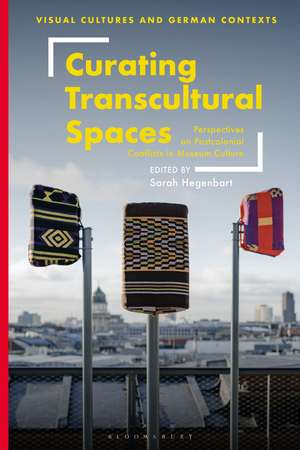Curating Transcultural Spaces: Perspectives on Postcolonial Conflicts in Museum Culture: Visual Cultures and German Contexts
Editat de Sarah Hegenbarten Limba Engleză Hardback – 7 feb 2024
Preț: 514.97 lei
Preț vechi: 733.89 lei
-30% Nou
Puncte Express: 772
Preț estimativ în valută:
98.55€ • 102.51$ • 81.36£
98.55€ • 102.51$ • 81.36£
Carte disponibilă
Livrare economică 24 martie-07 aprilie
Preluare comenzi: 021 569.72.76
Specificații
ISBN-13: 9781350227729
ISBN-10: 1350227722
Pagini: 280
Ilustrații: 78 bw illus
Dimensiuni: 156 x 234 mm
Greutate: 0.76 kg
Editura: Bloomsbury Publishing
Colecția Bloomsbury Visual Arts
Seria Visual Cultures and German Contexts
Locul publicării:London, United Kingdom
ISBN-10: 1350227722
Pagini: 280
Ilustrații: 78 bw illus
Dimensiuni: 156 x 234 mm
Greutate: 0.76 kg
Editura: Bloomsbury Publishing
Colecția Bloomsbury Visual Arts
Seria Visual Cultures and German Contexts
Locul publicării:London, United Kingdom
Caracteristici
An indispensable guide to engaging with colonial history in museum contexts, scrutinising numerous contemporary examples that examines the architecture, design and curation of museums in Germany and beyond.
Notă biografică
Sarah Hegenbart is a Lecturer in Art History at Technical University Munich, Germany. Prior to this, she worked as an Associate Lecturer at the Courtauld Institute, where she also undertook her doctoral research, and as Curator of Art at Pembroke College, UK. She has also worked in the cultural section at the German Embassy in London, after completing an M.St. in Ancient Philosophy at the University of Oxford and a Magister in Philosophy and History of Art at the Humboldt University of Berlin.
Cuprins
List of IllustrationsNotes on Contributors AcknowledgementsPreface: Positionality Statement 1. Introduction: Collaborating cultures, negotiating identities, Sarah Hegenbart (Technical University Munich, Germany) Part One: Curating Transcultural Spaces 2. Initial Legal and Policy Questions Surrounding Objects Dispossessed in Colonial Context, Kwame Opoku (previously, United Nations Office in Vienna, Austria)3. Symptoms of postcolonial aporia and (national) identity crises in Germany (Sarah Hegenbart Technical University Munich, Germany)4. Multiple Modernisms - curating the postwar era for the present, Kristian Handberg (University of Copenhagen, Denmark) Part Two: Confronting the colonial past and constructing identities on the African continent 5. The Architecture and Aesthetics of Apartheid: Dada in South Africa, a Case Study, Thomas Haakenson (California College of the Arts in San Francisco, California, USA)6. Contested Memories and Spaces: Art, Archives, and Ambivalence in 'Ovizire · Somgu: From Where Do We Speak', a case study from Namibia, Julia Rensing (University of Basel, Switzerland)7. Democracy reflected in Form Space and Order: Learning from West Africa's Ancient Empires, a Case Study from Nigeria, Olajumoke Adenowo (Architect, AD Consulting, Nigeria) 8. Westerns made in Africa, a Case Study from Burkina Faso, Camille Varenne (Filmmaker, Independent, France) Part Three: Post-Colonial Conflicts, colonial memories and negotiating identities in Germany 9. Troubling the Nation: Black Germans and the Teaching of History, Jeff Bowersox (University College London, UK)10. The African Diaspora Palace: The Pastfuture of Black Knowledge in Europe, Natasha A. Kelly (Filmmaker, Artist, Author, Berlin, Germany)11. Cosmopolitanizing Colonial Memories in Berlin: The Humboldt Forum and the current Shift in Germany's Culture of Remembrance, Thomas Thiemeyer (The University of Tübingen, Germany)12. Under the shadow of the Christian cross: visions, delusions, and national Realpolitik. Whose concepts will be seen, whose voices can be heard behind the coat of baroque facades inside a faked Prussian palace?, Viola Konig (Freie Universität Berlin, Germany) Conclusion Index
Recenzii
This compelling volume invites different perspectives and analysis to coexist about Germany's most controversial cultural projects of the last three decades, the Humboldt Forum. By framing such museum spaces as "transcultural", Sarah Hegenbarth highlights the significance of focusing on relationally, rather than essence in contemporary curatorial practice, opening up spaces for dialogue, conflict and debate.
Channelling multiple perspectives on the ways artistic, curatorial and architectural practices can address entangled colonial histories, this book explores novel forms of identity construction in museum spaces and their formative role in contemporary multicultural societies.
With 12 case studies from Germany all the way to South Africa, Namibia, Nigeria and Burkina Faso, this unique collection of critical and creative approaches to decolonizing and reshaping museum collections providesa timely intervention into the curating of colonial-era artefacts.
This timely book provides a sensitive and multi-layered look into Germany's current discourses around identity, heritage and museums. Boldly critical of the way colonial histories have been addressed, it highlights a plethora of artistic, architectural, museological and political histories which underpin present-day approaches to curating.
Channelling multiple perspectives on the ways artistic, curatorial and architectural practices can address entangled colonial histories, this book explores novel forms of identity construction in museum spaces and their formative role in contemporary multicultural societies.
With 12 case studies from Germany all the way to South Africa, Namibia, Nigeria and Burkina Faso, this unique collection of critical and creative approaches to decolonizing and reshaping museum collections providesa timely intervention into the curating of colonial-era artefacts.
This timely book provides a sensitive and multi-layered look into Germany's current discourses around identity, heritage and museums. Boldly critical of the way colonial histories have been addressed, it highlights a plethora of artistic, architectural, museological and political histories which underpin present-day approaches to curating.














